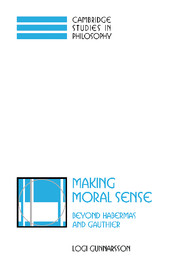Book contents
- Frontmatter
- Contents
- Preface
- PART I PROBLEMS
- PART II AGAINST RATIONALISM
- PART III FOR THE SUBSTANTIVE APPROACH
- 10 Self-understanding and self-assessment
- 11 The possibility of progress
- 12 Practical arguments vs. impossibility arguments
- 13 Evaluation of others
- 14 Universality without neutrality
- PART IV FOR PARTICULARIST SUBSTANTIVISM
- Appendix Transcendental vs. universal pragmatics
- Bibliography
- Index
12 - Practical arguments vs. impossibility arguments
Published online by Cambridge University Press: 22 September 2009
- Frontmatter
- Contents
- Preface
- PART I PROBLEMS
- PART II AGAINST RATIONALISM
- PART III FOR THE SUBSTANTIVE APPROACH
- 10 Self-understanding and self-assessment
- 11 The possibility of progress
- 12 Practical arguments vs. impossibility arguments
- 13 Evaluation of others
- 14 Universality without neutrality
- PART IV FOR PARTICULARIST SUBSTANTIVISM
- Appendix Transcendental vs. universal pragmatics
- Bibliography
- Index
Summary
In the discussion of subjectivist rationalism, I employed a practical argument in favor of the substantive approach. In the comparison between inter-subjectivist rationalism and the substantive approach, and in my defense of (particularist) substantivism, I shall also use practical arguments. Before I actually offer any more such arguments, I want to step back and reflect on this argumentative strategy. This is what I shall do in this chapter.
One may distinguish between three different philosophical strategies. Consider, for example, some common arguments against subjectivism. According to one kind of argument, it is impossible to be a subjective evaluator (someone who evaluates things only in the way that subjectivism assumes they can be evaluated). For example, it could be argued that to be a subjective evaluator is not consistent with the conditions of possibility of human agency. Another philosophical strategy is to argue that even though it may be possible to be a subjective evaluator, we do in fact often engage in evaluation which cannot be interpreted subjectivistically. I think that as an argument against subjectivism and moral skepticism, the first strategy fails: it fails because it is indeed possible to be a subjective evaluator and a thoroughgoing moral skeptic. And arguments of the second type do not suffice: even if we in fact perform acts incompatible with subjectivism and moral skepticism, it could be argued that we should revise our practices to make them fit these positions.
- Type
- Chapter
- Information
- Making Moral SenseBeyond Habermas and Gauthier, pp. 171 - 196Publisher: Cambridge University PressPrint publication year: 2000



